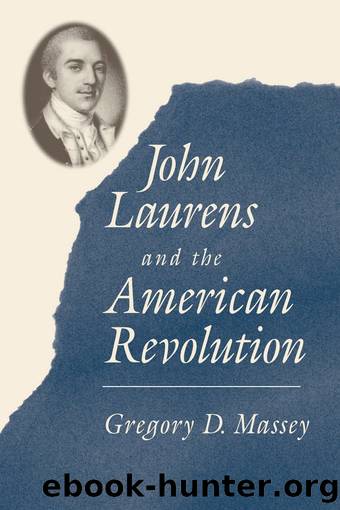John Laurens and the American Revolution by Gregory D. Massey

Author:Gregory D. Massey
Language: eng
Format: epub
Publisher: University of South Carolina Press
Published: 2016-11-15T00:00:00+00:00
Chapter 9
âHis inexperience in public affairsâ
Special Minister to France
December 1780âSeptember 1781
While Congress directed John Laurens to secure from the French a loan, supplies, and assurances that they would achieve naval superiority in American waters, astute observers realized that the former objective was most important. As Alexander Hamilton explained, âA loan of money is the sine qua non.â The delegates instructed Laurens to obtain from the French favorable terms for repaying the loan; they preferred to defer payment on the principal and interest as long as possible. Furthermore, Congress emphasized that disbursements to the United States be made in specie.1
Delegates who supported Benjamin Franklin realized that he would perceive Laurensâs appointment as an affront. Slightly apprehensive at the prospect of dispatching a young, untested diplomat on a critical mission, they included in Laurensâs instructions a directive to consult Franklin and take advantage of his experience. Congress informed Franklin of Laurensâs imminent arrival, assuring him that the young man came because his service in the army qualified him to give up-to-date information on Americaâs faltering military and financial fortunes. If Franklin received this notice before Laurens reached France, he was to initiate negotiations for the loan and supplies immediately.2
Laurens did not expect to obtain the entire loan requested by Congress, but he hoped to come as close to that sum as possible. Like previous American diplomats, he began with no practical experience; he would learn from on-the-job training.3
To assist him as secretary, Laurens chose Major William Jackson, a native of South Carolina and former aide-de-camp to Benjamin Lincoln. His first choice for that position had been Thomas Paine. The author of Common Sense, Laurens believed, would prove useful when it came time to present to the French in writing a convincing case for additional aid. Aware that he was detested by many delegates in Congressâin large part because of his biting attacks, in league with Henry Laurens, against Silas Deane and Robert MorrisâPaine declined the offer, but he agreed to accompany John in an unofficial capacity. Paine had ulterior motives. A controversial figure, embittered because he believed his adopted country did not appreciate his contributions to the war for independence, he longed to retreat to Europe. Laurensâs mission provided him that opportunity.4
Another factor may have led Laurens to Paine. The pamphleteer was influential in shaping American views of international relations. He had injected an element of idealism in the arena of foreign affairs, where issues were normally decided by power rather than moral considerations. Paine envisioned an independent United States fashioning a new world, where open commerce between nations promoted mutual understanding and peaceful relations. Laurens provided no written evidence that he had thought that far into the future. Up to now Johnâs ideas, including his black regiment plan and his endorsement of constitutional reforms, were connected primarily to winning the war. The amateur diplomat did grasp the fundamental reality of European diplomacyâthat questions of power and interest dictated the decisions of nations. With that understanding and with a single-minded focus on gaining money, supplies, and naval support for the American war effort, John departed Philadelphia.
Download
This site does not store any files on its server. We only index and link to content provided by other sites. Please contact the content providers to delete copyright contents if any and email us, we'll remove relevant links or contents immediately.
| Afghan & Iraq Wars | American Civil War |
| American Revolution | Vietnam War |
| World War I | World War II |
Waking Up in Heaven: A True Story of Brokenness, Heaven, and Life Again by McVea Crystal & Tresniowski Alex(37786)
Empire of the Sikhs by Patwant Singh(23072)
We're Going to Need More Wine by Gabrielle Union(19034)
Hans Sturm: A Soldier's Odyssey on the Eastern Front by Gordon Williamson(18572)
Leonardo da Vinci by Walter Isaacson(13316)
The Radium Girls by Kate Moore(12018)
Tools of Titans by Timothy Ferriss(8365)
Educated by Tara Westover(8045)
How to Be a Bawse: A Guide to Conquering Life by Lilly Singh(7471)
Permanent Record by Edward Snowden(5838)
The Last Black Unicorn by Tiffany Haddish(5629)
The Rise and Fall of Senator Joe McCarthy by James Cross Giblin(5274)
Promise Me, Dad by Joe Biden(5141)
The Wind in My Hair by Masih Alinejad(5091)
A Higher Loyalty: Truth, Lies, and Leadership by James Comey(4954)
The Crown by Robert Lacey(4806)
The Iron Duke by The Iron Duke(4349)
Joan of Arc by Mary Gordon(4100)
Stalin by Stephen Kotkin(3957)
